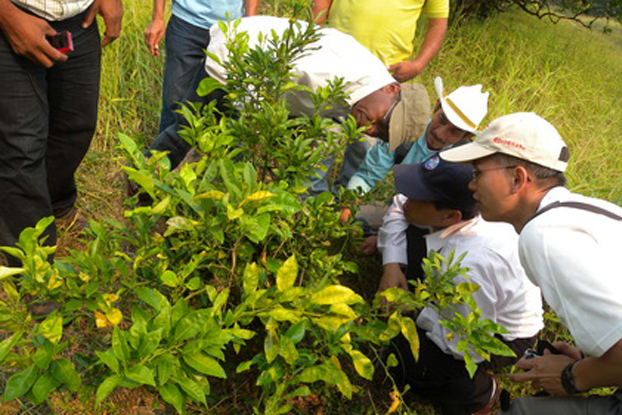
TaiwanICDF Responds to Media Reports that Projects by Overseas Missions to be Reduced, Says New Projects under Development
The Ministry of Foreign Affairs (MOFA) commissions the International Cooperation and Development Fund (TaiwanICDF) to carry out technical cooperation and associated operations on its behalf. To date, the long-term operations of Taiwan Technical Missions, overseen by the TaiwanICDF, have focused on assisting partner countries to enhance agricultural development, with fruitful results.
On one hand, development inputs from Taiwan Technical Missions over previous decades have helped partner countries to gradually build their basic capacity for development. On the other hand, newer development trends emerging in the wake of the OECD’s 2005 Paris Declaration on Aid Effectiveness, such as the principles of ownership and mutual accountability, have prompted the TaiwanICDF to improve its aid effectiveness by transforming a number of practices.
At present the TaiwanICDF operates two parallel systems — one mission-based and the other project manager-based.
Toward the end of 2011, the TaiwanICDF invited a number of external experts from a range of specialist backgrounds to review all of the projects that it was implementing. Among these projects, more than 20 projects that remain under implementation at Taiwan Technical Missions are due to be transferred to the cooperating stakeholders in partner countries, in accordance with partners’ explicit wishes. In addition to highlighting the effectiveness of work carried out by these missions over the previous several decades, the intention of many partner countries to take over such projects has revealed that they have already developed their basic agricultural capacity to a sufficient degree. Given these findings, authorities at the TaiwanICDF believe that if technical cooperation is not adjusted to complement partners’ domestic development status, then Taiwan’s expenditures on foreign aid would become inefficient and future projects would be implemented without meeting partners’ requirements in a professional and effective manner, and would also represent a failure to comply with the principle of ownership espoused in the OECD’s Paris Declaration.
In recent years, the TaiwanICDF has been promoting a system focused on project managers and, in response to the increasing diversity of projects that it implements, dispatching project managers who have experience of international affairs or a clear talent for project management. Thanks to a rational approach toward coordinating and integrating the work of the consultants and technical experts required for each project, such personnel have been able to gain a renewed focus on their professional work, which is bringing a greater energy and depth to project implementation.
Over the past years, a significant number of projects implemented by overseas missions that have reached their objectives and thereby arrived at a transitional phase have been transferred in accordance with the needs of host countries, who have continued to implement such projects. Given this situation, the TaiwanICDF has been actively developing new projects, and more than 20 initiatives are currently under appraisal. The organization is seeking to meet partners’ needs by expanding the scale of projects and actively developing cross-cutting measures that can be applied during the implementation of newer projects. Following recent negotiations with the Regional International Organization for Plant Protection and Animal Health (OIRSA), for example, agreement was reached on a project to control Huanglongbing, a disease affecting citrus fruits, at a regionwide level throughout Central America.
Furthermore, the organization has been actively promoting projects involving geographic information systems and ICT, as well as promoting the flexible application of lending and investment resources, to pursue development outcomes that meet partners’ genuine needs. In accordance with a need expressed by the government of Panama, for example, the TaiwanICDF is presently appraising a new project that would promote the processing of waste produced by local fisheries.
Once technicians at overseas missions have transferred a project on to local counterparts, the TaiwanICDF will reassign such staff to serve on other projects at other missions, in accordance with their specific expertise. In such cases, the organization will assist these technicians to improve their professional knowledge and skills, so that they maintain the full range of skills needed to handle project transfers in future.
Two bilateral technical cooperation projects – the Integrated Agricultural Development Project and the Integrated Fisheries Development Plan – that were under implementation in Panama, for example, have now arrived at a transitional phase. Having reached agreements with Panamanian authorities and gradually handed these projects over, some of the technical staff involved in these projects have been reassigned to overseas missions in Belize, Bahrain and Guatemala in accordance with their expertise.
Funding for the TaiwanICDF’s international development assistance operations comes partly from its own Fund, and partly from commissions funded by MOFA. MOFA-funded commissions, which represent only a proportion of MOFA’s total spending on foreign aid, declined slightly from 2008 to 2011. However, the TaiwanICDF’s project-oriented approach and its efforts to expand the scale of projects have prompted MOFA to commit to a number of new initiatives, for which reason funding from the ministry is set to increase by 6.92 percent through 2012.
The TaiwanICDF continues to develop and appraise new projects in its partner countries. Once a project has been identified and judged to be feasible, the organization will explore means of enhancing the depth and effectiveness of the aid that a partner country will receive. When new projects generate new openings for overseas personnel, the TaiwanICDF will support the further development of its current technicians’ professional careers by giving priority to those who are willing and professionally qualified to make the most of such opportunities.
- Update: 2018/03/01
- Hits:716

